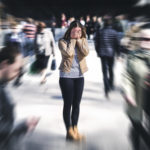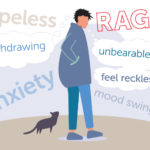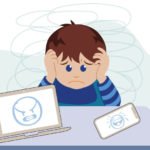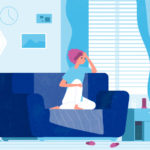Anxiety in kids during COVID-19: What parents should know
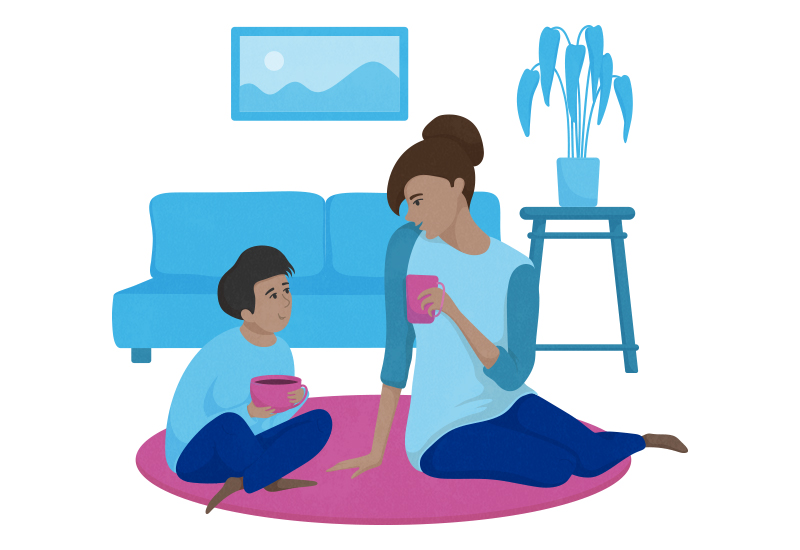
Some kids hide in their rooms. Others turn their cameras off during remote learning and don’t want to talk to anyone. Still others feel panicky when they do go out in public. As the COVID-19 pandemic wears on, its effects on our mental health may have become increasingly noticeable — especially in children and teens. “My daughter used to be really energetic and motivated,” says one mother. “She was happy and light. Now, she’s just folded into herself.”
She’s not alone. Families are reporting troubling changes in their children’s emotional well-being, particularly when it comes to anxiety. To better understand the problem — and learn what parents can do to help — we spoke with Allison Scobie-Carroll, senior director of social work and family services at Boston Children’s Hospital.
A lot of kids seem to be experiencing increased anxiety. Why?
Like adults, children and teens are missing being around their peers. They need those relationships not just to feel good, but also to practice social skills. Now that we’ve been in this for almost nine months, we’re seeing the effects of what happens when children are separated from regular social interaction for long periods of time.
What are some aspects of the pandemic that can cause or worsen anxiety in kids?
Our “new normal” means that the way we interact with each other has changed. Things that once came naturally — like just being out in the world — are now fraught with concern. If a child is already prone to anxiety, the rejection they might feel when someone steers away from them may be amplified, even if that person is simply trying to physically distance.
Then add in masks, which can contribute to anxiety in a couple of different ways. First, they block our ability to read social cues, like smiles or frowns. They can also impede the ability to practice deep breathing, which is a natural way to counteract anxiety and for some people contributes to feelings of claustrophobia. That said, masks are critical to protecting against COVID-19, and most kids have adapted well to wearing them.
Can kids “catch” anxiety from their parents and other adults?
Collectively, we’re transmitting a lot of worry and kids absolutely pick up on that, particularly if they’re already sensitive or prone to anxiety.
What can parents do to help their children cope with anxiety?
The most important thing you can do is to let your child know you’ll be there for them — it’s so simple but so fundamental. You can also try the following tips.
Listen to them. Children experience and navigate the world through a different lens than adults. Their worries need not be rational or fact based, but they are still valid.
Teach them coping skills. Regular exercise, turning off screens at least an hour before bed, and using apps like Calm to practice deep breathing and other relaxation techniques can all help kids (and parents) ease anxiety.
Schedule safe playdates. There’s no substitute for being around friends — kids relate to each other in ways that adults just can’t. Ask your child if they’d be interested in seeing the friends in their circle, as long as they follow safe precautions like wearing masks and practicing physical distancing.
Connect with other parents. The pressures of life right now might make you feel something is very wrong with your child — but many families are experiencing the same thing. Situational anxiety can be a natural response to chronic stress. It can help to know that it’s not a failure on your part and that you aren’t alone.
Know your child. A lot of kids and adults are experiencing panic attacks, having night terrors, or developing phobias for the first time during the pandemic. If you’re concerned about new or worsened symptoms in your child, contact your primary care provider for help.
Get more answers about Boston Children’s response to COVID-19.
Related Posts :
-

Answers to six questions about anxiety in children and teens
Between school and social demands, lots of children feel stress, but at what point does anxiety cross the line and ...
-

COVID and suicidal thoughts: Help for families
Earlier this month, the U.S. Centers for Disease Control and Prevention (CDC) released stark new figures on mental health ...
-

Cyberbullying in the age of COVID-19: How to protect your kids
Now that so many classrooms across the country have moved totally or partially online, kids of all ages are spending ...
-

Dealing with feelings of grief in the time of coronavirus
As the COVID-19 outbreak moves into another month, do you find yourself feeling angry? Helpless? Sad? Lost? Disappointed? Accepting? Or ...


